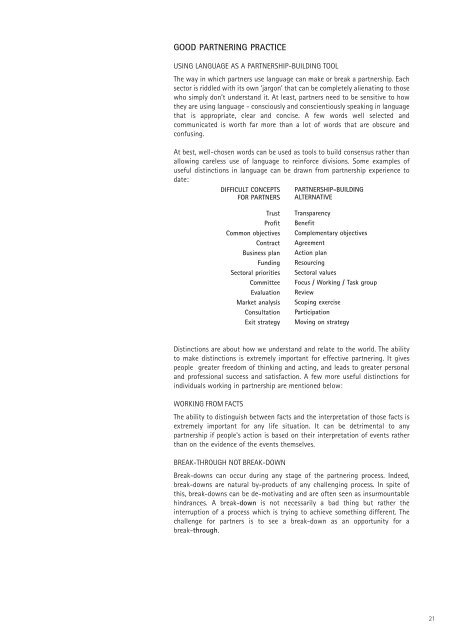Partnering
The Partnering Toolbook - Energize, Inc.
The Partnering Toolbook - Energize, Inc.
- No tags were found...
You also want an ePaper? Increase the reach of your titles
YUMPU automatically turns print PDFs into web optimized ePapers that Google loves.
GOOD PARTNERING PRACTICE<br />
USING LANGUAGE AS A PARTNERSHIP-BUILDING TOOL<br />
The way in which partners use language can make or break a partnership. Each<br />
sector is riddled with its own ‘jargon’ that can be completely alienating to those<br />
who simply don’t understand it. At least, partners need to be sensitive to how<br />
they are using language - consciously and conscientiously speaking in language<br />
that is appropriate, clear and concise. A few words well selected and<br />
communicated is worth far more than a lot of words that are obscure and<br />
confusing.<br />
At best, well-chosen words can be used as tools to build consensus rather than<br />
allowing careless use of language to reinforce divisions. Some examples of<br />
useful distinctions in language can be drawn from partnership experience to<br />
date:<br />
DIFFICULT CONCEPTS<br />
FOR PARTNERS<br />
PARTNERSHIP-BUILDING<br />
ALTERNATIVE<br />
Trust<br />
Profit<br />
Common objectives<br />
Contract<br />
Business plan<br />
Funding<br />
Sectoral priorities<br />
Committee<br />
Evaluation<br />
Market analysis<br />
Consultation<br />
Exit strategy<br />
Transparency<br />
Benefit<br />
Complementary objectives<br />
Agreement<br />
Action plan<br />
Resourcing<br />
Sectoral values<br />
Focus / Working / Task group<br />
Review<br />
Scoping exercise<br />
Participation<br />
Moving on strategy<br />
Distinctions are about how we understand and relate to the world. The ability<br />
to make distinctions is extremely important for effective partnering. It gives<br />
people greater freedom of thinking and acting, and leads to greater personal<br />
and professional success and satisfaction. A few more useful distinctions for<br />
individuals working in partnership are mentioned below:<br />
WORKING FROM FACTS<br />
The ability to distinguish between facts and the interpretation of those facts is<br />
extremely important for any life situation. It can be detrimental to any<br />
partnership if people's action is based on their interpretation of events rather<br />
than on the evidence of the events themselves.<br />
BREAK-THROUGH NOT BREAK-DOWN<br />
Break-downs can occur during any stage of the partnering process. Indeed,<br />
break-downs are natural by-products of any challenging process. In spite of<br />
this, break-downs can be de-motivating and are often seen as insurmountable<br />
hindrances. A break-down is not necessarily a bad thing but rather the<br />
interruption of a process which is trying to achieve something different. The<br />
challenge for partners is to see a break-down as an opportunity for a<br />
break-through.<br />
21


